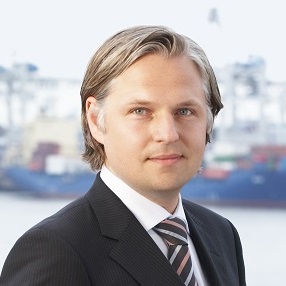Dr. Marco Remiorz, Dabelstein & Passehl, Germany
The District Court of Hamburg – very experienced in shipping matters – has denied the liability of a freight forwarder for the loss of goods due to the sinking of the MOL Comfort.
The defendant, a German freight forwarder was instructed with a multimodal transport from Hong Kong via Hamburg to Eichenzell, Germany. The ocean carrier subcontracted by the defendant loaded the shipment aboard the MOL Comfort. On June 17th 2013 the MOL Comfort sustained damage in the Arabic Sea, broke into two parts and finally sank. The respective shipment of bouncy castles was lost.
The MOL Comfort had been built in 2008 and was classified by Nippon Kaiji Kyokaj right before the journey in May 2013. The classification society awarded the vessel with the classification certificate based on its special survey without any complaints. According to the defendant despite the classification, the MOL Comfort had to be considered as not seaworthy due to cracks in its hull which had not been detected during the survey. These cracks led to the water break-in during the journey and eventually caused the sinking as is undisputed between the parties.
The plaintiff claims compensation for the loss of his shipment up to the amount of the value of the lost goods. According to the B/L the shipment had been packed into 732 cartons and stored into one container by the shipper. The B/L contained a “said-to-contain” clause. The plaintiff argued that the claim amount is within the limitation of liability of 666,67 SDR per package while defendant rejects the liability due to the vessel having been unseaworthy. The latter condition could not have been detected by the defendant leading to an exemption of liability due to § 498 of the German Commercial Code (“HGB”). Alternatively, limitation of liability would not exceed 666,67 SDR as just the container as such would have to be taken into account when calculating the package limitation.
The District Court of Hamburg disallowed the claim.
The court ruled that any claim for compensation was precluded, as the defendant could rely on § 498 II 2 HGB. According to this stipulation, the liability of a carrier in the event of a vessel not being seaworthy is precluded, if he can prove that the loss results from circumstances which could not have been prevented by a carrier exercising due diligence.
The court took for granted that there had not been any mistakes as regards the stowage or stability of the vessel and denied other circumstances leading to the sinking. Thus, the sinking only could have been caused by the cracks in the hull as consequence of a construction error of the MOL Comfort which lead to the unseaworthiness of the vessel.
The court decided that the freight forwarder is not responsible for errors in construction of the vessel. Undisputedly, the defendant had no knowledge of the unseaworthiness of the vessel. The defendant cannot be considered responsible for this lack of knowledge as there had been no indication whatsoever which would have required him to check. Same applies to the ocean carrier as defendants’ subcontractor who was right when relying on the findings of the classification society right before the final journey.
Any possible misconduct of the shipyard or the classification society cannot be attributed to the defendant either, as none of these can be considered to be his subcontractor.
The judgment is one of the first dealing with the new German maritime law and a quite remarkable one as the experienced District Court of Hamburg did not take evidence on the unseaworthiness of MOL COMFORT but decided on basis of the facts made available.
The court further more made clear that there is no obligation of the German freight forwarder being liable as carrier to check the construction of the vessel booked on its properness unless the is an indication of something being wrong.
The decision might be surprising but is fair and reasonable after all. From plaintiffs perspective not being able to recover damage seems to be hard to accept especially when taking into account that the risk of cargo suffering damage while in the carriers custody is on the latter. However, in a situation where the class has recently been confirmed and there being no signs of the vessel being unseaworthy at the beginning of the voyage one would overstress the responsibility of the carrier to check what has recently been confirmed. The carrier must be able to rely on classification certificates from a legal and practical point of view.
The judgment is in line with a 10 year old judgment of the Hamburg court of appeals confirming that a tenant as warehouseman of a storage facility does not have to check the construction of the building but can rely on permits being made by the public authorities.
It goes without saying that the decision is not legally binding yet and expected that the Hamburg Court of Appeals in case called will take evidence on the (un)seaworthiness of the MOL COMFORT before dealing with the question of what needs to be done by a German freight forwarder when transporting goods on a foreign vessel from Asia to Europe as regards the extent of due diligence.
We expect the Hamburg Court of Appeals to confirm the judgment.

